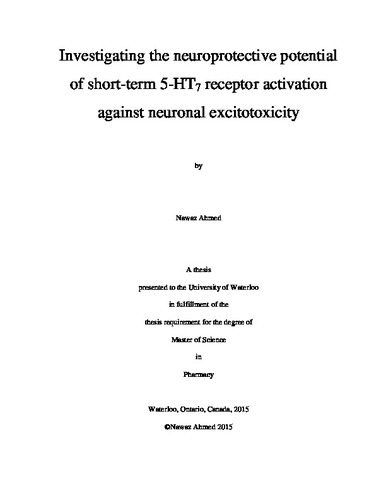| dc.description.abstract | The pathophysiology of cerebral ischemia or acute ischemic stroke involves what is called neuronal "excitotoxicity", where an initial failure in intracellular energy metabolism causes excessive pre-synaptic glutamate release that over-stimulates ionotropic receptors, particularly the N-Methyl-D-aspartate (NMDA) receptor. Pharmaceutical research endeavours in the past decade that developed and tested therapeutics against glutamate neurotoxicity have exhibited dose-limiting adverse CNS effects in several large scale stroke clinical trials. Given their involvement in glutamatergic neurotransmission, serotoninergic compounds offer a method to modulate glutamate neurotoxicity without evoking unacceptable side effects.
A novel neuroprotective mechanism against NMDA induced excitotoxicity involves cross-talk between 5-hydroxytryptamine (serotonin) type 7 (5-HT7) receptor and a growth factor receptor called the platelet-derived growth factor β receptor (PDGFRβ). In primary hippocampal neurons, long-term (24 hour) activation of the 5-HT7 receptor by small molecule ligands increase the expression of PDGFRβ that in turn phosphorylates a downstream effector which differentially regulates NMDA receptor subunit expression to prevent NMDA-induced neurotoxicity. Direct activation of platelet-derived growth factor (PDGF)β receptors in primary hippocampal and cortical neurons inhibits NMDA receptor activity and attenuates NMDA receptor-induced toxicity. This study aimed to determine if such a neuroprotective pathway could be active with short-term application of a 5-HT7 receptor agonist. Western blot analysis revealed that 2 to 4 h activation of 5-HT7 receptors in primary hippocampal neurons increased tyrosine 1021 phosphorylation (PLCγ binding site responsible for down regulating NR2B containing NMDA receptors), as well as TrkB-FL receptor expression and phosphorylation. In addition, sustained increases in PLCγ1 expression and Akt activation were observed. Cell viability assays performed in primary hippocampal neurons showed that 2 and 4 h pre-treatment with LP 12 was neuroprotective against NMDA insults.
Similar results were observed in HT22 cells. After extensive characterization of the cell line, we determined that differentiated HT22 cells were susceptible to NMDA-induced excitotoxicity. Similar to primary neurons, HT22 cells treated with 4 h LP 12 resulted in an increase in tyrosine 1021, ERK1/2, PLCγ1, and Akt threonine 308 phosphorylation. MTT viability assays in differentiated HT-22 cells suggested that neuroprotection against NMDA can be observed with 4 h LP 12 pre-treatment and that a sustained rise in 5-HT7 receptor expression occurs during neuronal excitotoxicity.
These findings expand the potential role of 5-HT7 receptors as a drug target beyond neuropsychiatric illnesses and provide further evidence for the possibility of producing growth factor receptor-dependent neuroprotective effects using small-molecule ligands of G protein-coupled receptors for neuronal excitotoxicity. | en |

